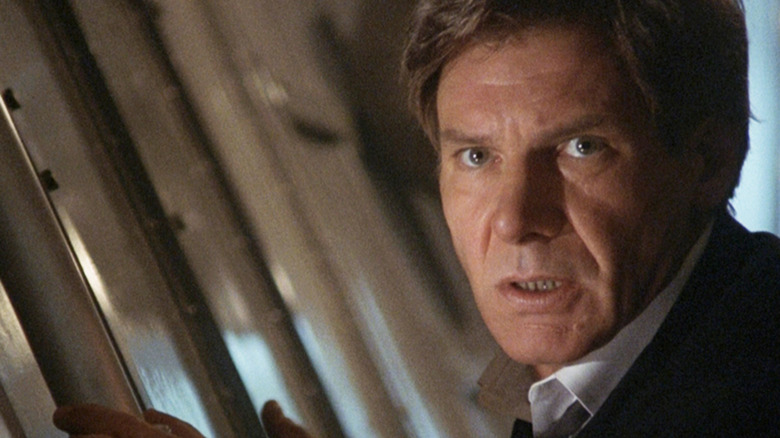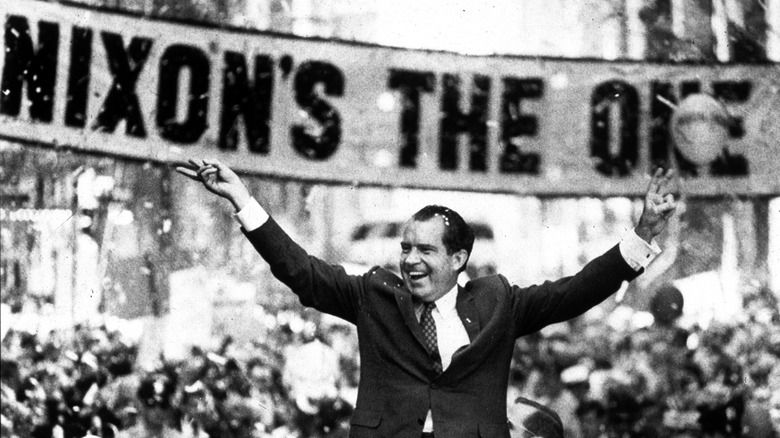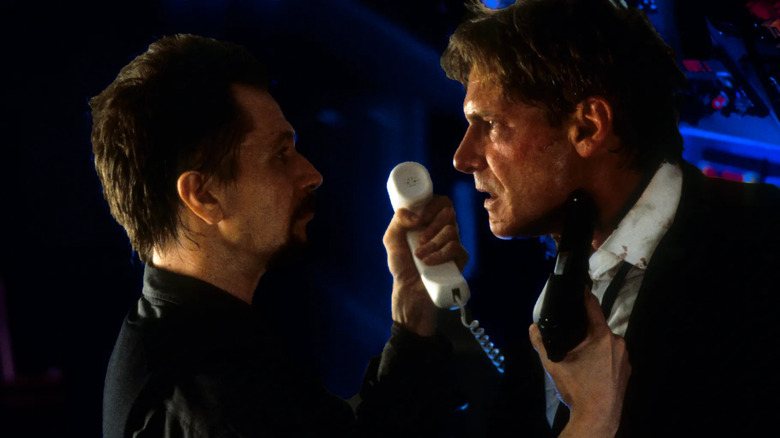Why An Air Force One Reboot Would Be A Way Bigger Challenge Than It Was In 1997
The premise of "Air Force One" — President James Marshall (Harrison Ford) foils terrorists who hijack his plane, John McClane-style — requires national unity. The film calls for you to root for the president and only works if the majority of the audience (i.e. the U.S. population) sees their president as an unimpeachable good guy (pun intended). That is simply not the reality of America of 2024. "Air Force One" screenwriter Andrew Marlowe spoke to Syfy recently about why, to use the cliché, the film couldn't be made today.
"When we were doing it, the presidency and that position was not as politically charged as it is today. And so, I think that there are specific challenges about doing it in the contemporary climate that we would have to figure out."
Marlowe adds he'd only be interested in a follow-up if it reflected the world as is now: "Are we saying something new? Are we saying something relevant to the culture now? We don't want to do something that's just exploitative storytelling, we want to do something that feels like it has a purpose in the world." One complication leads to another.
Now, national divisions have always been there. Notice how "Air Force One" never specifies President Marshall's party; if you made him a Republican, for instance, then you make all the Democrats in the audience less inclined to root for him (and vice versa). True in 1997, definitely true in 2024.
People of my generation — born in the same decade as "Air Force One" — don't remember a less divisive world ever existing. How did America get here?
How America got here
You can't pin an entire political climate on a single factor or figure ... but a lot of the blame for the mess we live in falls on Richard Nixon. Just ask historian Rick Perlstein, author of four tomes about the rise of conservatism in 20th-century America ("Before The Storm," "Nixonland," "The Invisible Bridge," and "Reaganland"). Perlstein's books focus as much on the national mood and its shifts as they do on palace intrigue, which is why they're useful historical texts.
In "Nixonland," Perlstein documents how at Whittier College, Nixon belonged to a social club called the Orthogonians, made up of lower-class students who wouldn't be at college without grit and luck. Their rivals were the Franklins, made up of the rich kids. Social striving resentment against "the elite" burned in Nixon's soul until the day he died and fueled his political career. (For a dramatization, watch Robert Altman's "Secret Honor," featuring Philip Baker Hall as Nixon spewing a 90-minute rant of paranoia about real and imagined enemies conspiring to destroy him.)
When Nixon ran for President in 1968, he stoked the pre-existing divisions in the country, calling on the "silent majority" of average (white) Americans to support him. They believed him since he was one of them and so delivered him to the White House. And then, the Watergate scandal happened and Nixon resigned. Since he'd cultivated power based on resentment, his being tossed from office only aggrieved his supporters. It wasn't justice, no, but a conspiracy to keep them downtrodden.
Air Force One in 2024
Resentment continues to be the animus of those who vote republican and the 1990s is when it got out of hand. Arch-reactionary Rush Limbaugh ruled the radio airwaves and in 1996, Fox News launched under the direction of former Nixon consultant Roger Ailes. Once Bill Clinton ended 12 years of continual Republican Presidency in 1992, Congressman Newt Gingrich (and future Speaker of the House) enforced the campaigning strategy of Democrats as the enemy who must be vanquished — and it paid off spectacularly when his acolytes took control of Congress in 1994's "Republican Revolution" midterm elections.
Even as the two parties remain way more aligned on (right-leaning) policy than they should, each subsequent President has only widened the gaps between their supporters. You don't get President Obama without the failures of George W. Bush, and you don't get President Trump without backlash against Barack Obama fueling another resentment vote. Since America's Constitution takes good faith cooperation as a given, gridlock at the levers of power endures and only creates more anger against the people who sit at them.
I don't want to convey the false idea that all America needs is people to meet each other in the middle. If anything, democrats are generally too eager to make nice with republicans, while many of the GOP are too bigoted or destructive to countenance. But the simple fact is that for some sections of the country, the president is now a bad guy depending on which party they belong to, and who that section is swaps back and forth every four or eight years.
If you tried to make "Air Force One" today, you'd inevitably be cutting out a chunk of the audience — and that's not how Hollywood does business.


